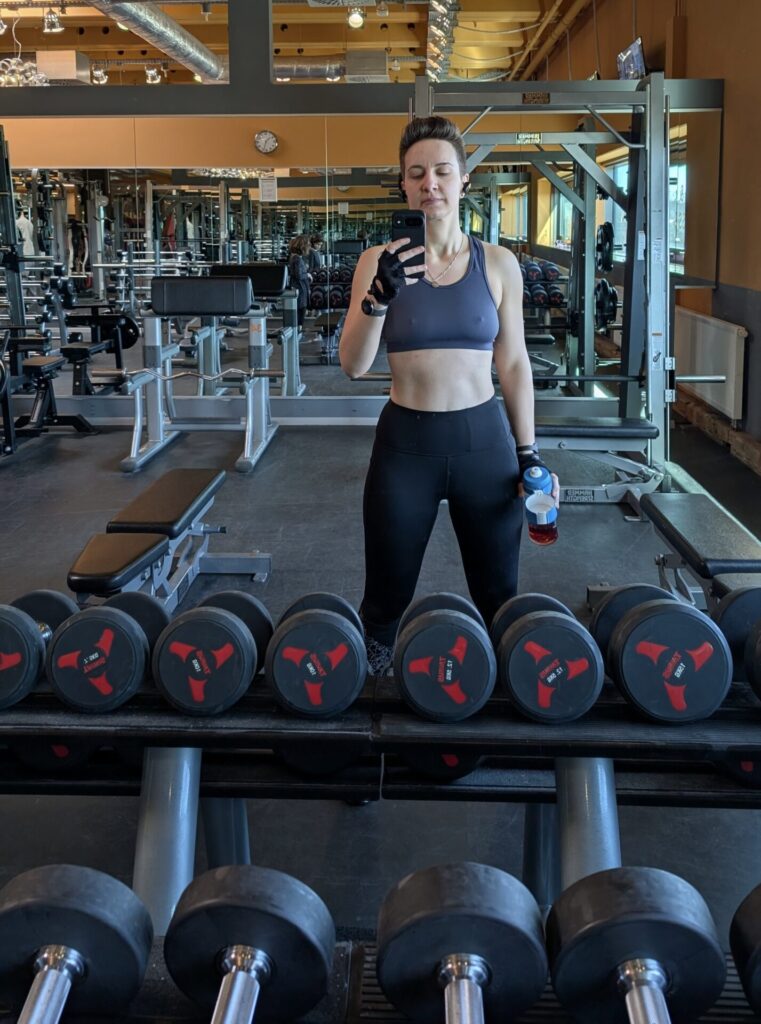Rocket till Summer, or About the “Beach Body” and Sexism in Gyms.
“I finally signed up for the gym so I can get ready for summer in time. I want to achieve the perfect summer body,” proudly announced a young male friend during brunch on what seemed like just another ordinary Saturday.
“What are you talking about, please? What summer body? You have a body—go to the beach, simple as that.
Is it really possible you’re falling for that kind of societal pressure where both men and women must look a certain, socially conditioned way just to enjoy summer?” I blurted out, slightly shocked, unable to hold my tongue.
Not to mention, the young man is in his 20s and has a perfectly normal physique, so the very idea that he would succumb to such unnecessary pressure—to reach perfection, whatever that even means—seemed utterly incompatible with the reality I believed young people today lived in.
I lived under the impression that we millennials were the last generation indoctrinated to hate our bodies and to constantly strive for an Apollonian ideal that only exists with the help of Photoshop.
Gen Z was supposed to be free, to accept themselves as they are, right?
The second shock came from the fact that such “concern” about appearance was coming from a young man, because until now, I had only ever heard such comments from women.
It opened a new perspective for me on the issue because obviously men also worry about how they look and whether they meet unrealistic standards set by the media.
Pink equipment, for the girls
The discussion didn’t end there—it only gained momentum. We started comparing gyms in the city, not just by price but also by the facilities they offered. Then, completely nonchalantly, the youngster said:
“Our gym has a section reserved only for women, and of course, all the equipment there is pink.”
To which I, thinking aloud, responded:
“Hm, if a gym has a separate section for women, something is seriously wrong. They clearly anticipate the kind of clientele they attract, so such a move is necessary.”
“What do you mean?”
“Personally, I would never go to a gym that has a women-only section because, to me, that’s a sign that women aren’t safe there and that’s why they get a separate space.”
And I hit the nail on the head. He confirmed my theory by saying:
“Yeah, I’ve noticed there are groups of men who react quite loudly and inappropriately, commenting on women as they walk through the gym toward that women-only section.”
There it is. And so it begins…
Another male friend in his 30s chimed in:
“Yeah, it’s really not okay how some women nowadays come to the gym. They deliberately dress provocatively, wearing tight leggings and sports bras, and then it’s no wonder men react.”
I couldn’t see my own facial expression at that moment, but I imagine it was equivalent to a cartoonish jaw-dropping moment. There was no time to count to ten or practice Mel Robbins’ “Let them” theory. The red alarm light went off in my head, and the furious feminist in me had to react immediately.
“Male nature” as an excuse
“Wait a minute, do you seriously think women go to the gym to ‘provoke’ men?!”
“Well, you know, it used to be different. Women dress normally for the gym, wearing sweatpants and baggy shirts, but now they dress too provocatively. And then they complain when they get commented on.”
“Hold on, hold on… First of all, a woman has the right to dress however she wants and feels comfortable, and believe me, 99% of women dress for themselves, not for men—whether they’re going for a walk or to the gym, it’s the same.
What matters to us is feeling good in our own skin, not attracting comments that make us uncomfortable or fearful for our safety.
And secondly, news flash, women go to the gym to exercise and work on THEIR OWN bodies, not to provoke immature men.”
“Well, what do they expect? It’s in men’s nature to react to external stimuli.”
There it is.
“That’s actually not an argument because men are not animals incapable of controlling their urges. When you need to go to the bathroom, you don’t just relieve yourself in the middle of the street, do you? You find the nearest restroom.
That’s called controlling natural impulses, something every living being can do, regardless of gender.
On the other hand, you and other men react to ‘sexualized’ stimuli because SOCIETY allows you to do so under that convenient excuse. It has nothing to do with nature.
As Simone de Beauvoir said in her seminal work ‘The Second Sex’—
one is not born a woman; one becomes one. The same goes for men.
For centuries, society has allowed men to ‘be boys’ while women’s sexuality was suppressed to the point that the ideal woman, especially in the Christian West, became the Virgin Mary—completely asexual to the point of immaculate conception, thus fulfilling the primary female role: becoming a mother.
She was set as an unattainable ideal for all women who came after her. All others, who did not strive toward that ideal, were labeled as whores.
According to that logic, a woman can either be a saint or a whore—there’s nothing in between.
Ultimately, women are defined in society solely by how men perceive them, not how they feel about themselves.
By the way, you’re just a step away from justifying rape with the question, ‘What was she wearing?’—and honestly, I believe you don’t want to go there,” I said, getting a little heated.
“That’s not the same thing!”
“That’s where you’re wrong, because these exact premises lead to those kinds of justifications.
Let’s put it this way: how would you feel if your girlfriend came home upset after a workout because some guys at the gym harassed her?
Would you first ask her ‘What were you wearing?’ or would you want to punch those jerks?”
“That’s different!”
“The point is—it’s not. All women, whether or not they have a personal connection to you, should be treated with respect, not as sexual objects made for male gazes and inappropriate comments.”
As a woman who regularly goes to the gym, I can say with certainty that almost none of my fellow women work out thinking, “What can I wear today so that men will look at me?”
I go to the gym to work out for myself, for my health, for my body, and for the good feeling I have after a workout.
Lately, Sofia has been coming with me to almost every training session. While I work out, she reads or listens to her little stories. Everyone adores her, and I can see the sparkle in her eyes as she watches me exercise.
That’s why I go to the gym—to be a role model, strong and healthy, for my daughter.
And I certainly wouldn’t take her to a gym where adult women don’t feel safe, let alone little girls.
I gladly pay a high monthly membership fee and chose a studio that doesn’t have a “special section with equipment for women,” where the clientele is significantly older and serious about fitness—and surprise, people there come to exercise, not to “ogle” others.
On the contrary, when I see women and men in their 60s and 70s working out diligently beside me, it only motivates me more to come regularly, not only to reach that age but also to be as vital and fit as they are.
I’ve always admired women who have enough confidence to work out in a sports bra and leggings, regardless of age or body type.
That was my goal too—to be confident enough to feel good dressed like that. And I achieved it. For more than half a year now, I’ve been working out in that outfit myself.
When I look at myself in the mirror, I think, “Damn girl, you look good,” and that motivates me to keep training and to keep being better FOR MYSELF!
I don’t go to the gym to fish for compliments from others, and I believe neither do most women—or if some do, they are a minority. And even then, I have nothing against it—you do you.
But the point is that men have neither the biological nor the social right to comment on women’s clothing or to justify inappropriate behavior by invoking “nature” and “urges.”
Double standards
It’s socially acceptable for men to walk around shirtless, and no one bats an eye, but if a woman were to walk around without a shirt and bra, everyone would stare, protest, or probably even call the police.
Male nipples are socially acceptable—even on social media—but female nipples are deemed vulgar, sexualized, and strictly censored.
And again, this has nothing to do with nature, but with socially imposed norms.
Sadly, women’s bodies have been sexualized for centuries and portrayed primarily as objects for male pleasure and reproduction.
In her book Women Don’t Owe You Pretty, Florence Given brilliantly sums up this entire problem:
“Objects don’t need to be empowered; they are objects.”
This approach assumes that women are not seen by men as subjects who can decide for themselves how they dress, but merely as objects there for male viewing pleasure and needs, under the excuse of “that’s just male nature.”
The greatest defeat comes when women themselves accept this pattern, when I hear them say, “He’s a man, men function differently and can’t control themselves, so we women use our sexuality as a weapon to get what we want, because that’s just male nature.”
Such comments only prove how deeply patriarchy has poisoned even the minds of strong, emancipated women.
This “argument” has been used for centuries to justify men’s behavior toward women. And it’s not just about gyms—it permeates every area of life, including the workplace.
This pattern allows men to hire only a certain type of woman, not based on her skills or what she has to say, but solely based on whether they find her attractive.
And we, women, need to stick together, not judge each other based on appearances—whether it’s at the gym, at work, or in the street.
Feminism is about freedom of choice.
If you want to show up at work fully made up and in a mini skirt—you can.
And if I want to go to the gym in shorts and a sports bra—I can too.
Neither outfit implies who is “smarter” or more competent, nor does it invite male comments or, heaven forbid, male reactions.
“Women Don’t Owe You Pretty”
News flash: we don’t live our lives just for male looks and satisfaction—actually, quite the opposite.
Many of us have, countless times, chosen to dress “more modestly” when going out just to avoid unpleasant stares and even more unpleasant comments.
The problem is so widespread that it even has a name: catcalling.
Catcalling—shouting out often sexual or offensive comments to women in public—is now recognized as a form of sexual harassment and street violence, and in several countries, it’s already legally banned and punishable.

Source: Chat GPT
Let’s flip the perspective:
How would you, dear “stronger sex,” feel if we women behaved just one day like men?
If we sat in groups loudly commenting on every one of you walking by in tight shirts or pants?
And when you complained, we nonchalantly answered, “It’s not our fault; that’s just our nature.”
I’m sure you wouldn’t like it, right?
Breaking news: women are not on this planet to please you or to serve you. Sorry to disappoint you.
The sooner you wake up from the patriarchal dream, the easier it will be—for you and for us.
And who knows—maybe you’ll realize that neither you nor we need a “summer body.”
Everyone should train for their own health, not to fulfill some unattainable social norm.
Let’s stop being objects, because, honey, we are strong empowered SUBJECTS!
Sincerely,
S-Mama







Leave A Comment